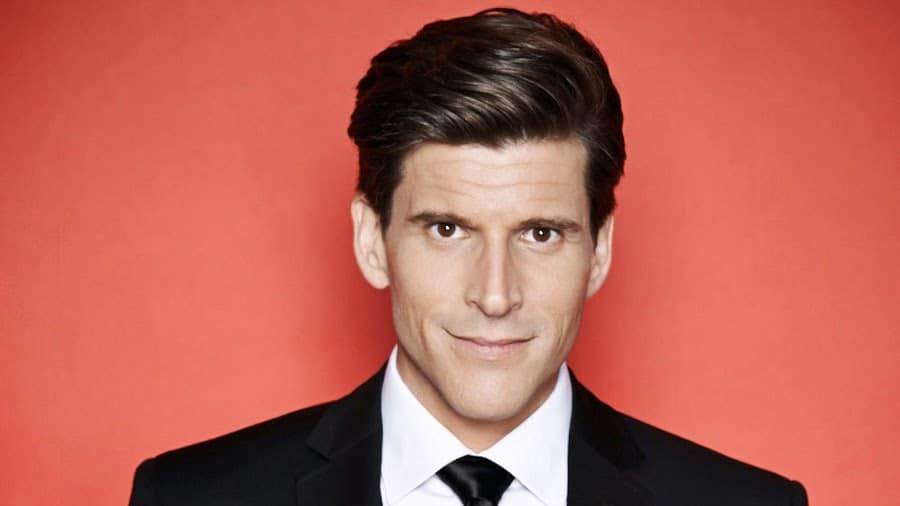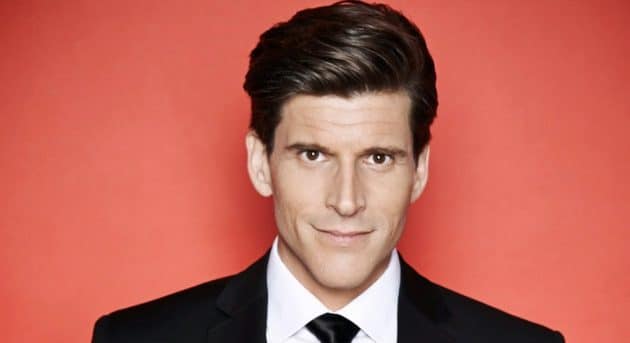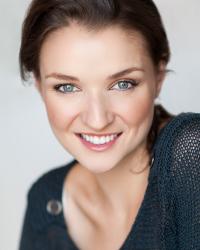How to deal with fame. Rachel Cole with Osher Günsberg
Every professional industry is its own little world, with power structures, behaviour codes, systems and celebrities. The behaviour codes backstage at the Capitol Theatre are very different to a corporate office. Backstage, my bottom gets slapped approximately 48 times a day. When I used to work in Psychology Research, a solitary pinch would see you fired in a handsy heartbeat.
Apart from showbiz, politics, or sport these professional microcosms go largely unnoticed by the outside that world. Someone who is famous in the world of finance and law probably means nothing to most actors. Likewise, the lead in a commercial musical would seldom be recognised on the street. Fame is relative. It has nothing to do with you, but only what someone else thinks of you.
It is an unavoidable reality of the entertainment industry that what we do is public. Lots of people see what we do, and some choose to take a heightened interest in our lives, activities and daily banalities. Like what we ate for breakfast – obvi another Acai bowl from Kiss The Berry #skinny (#eyeroll). The circularity here is that most performers are whores for attention and will do everything in their power to increase their public presence, because it’s a form of social and professional currency.
Fame can arrive very quickly and often performers think that’s what they want, but are entirely unprepared for the reality of what it’s like. I thought carefully about whom to interview for this topic and landed on Osher Günsberg because, not only has he personally experienced a life in the ever increasing spotlight but he has also witnessed countless people have had fame thrust upon them overnight via Australian Idol and The Bachelorette.

Osher Günsberg, sometimes known by his previous stage name Andrew G, is a well known television and radio presenter, best known for hosting Australian Idol and more recently The Bachelor and Bachelorette. From 2004-2009 he hosted Take 40 Australia. He landed his first job hosting on Channel V after sending in a tape of himself on his skateboard. He has also narrated the seasons of Bondi Rescue and Recruits. He has been nominated for a Logie award, and was the Cleo Bachelor of the year in 2004. This is his advice on how to deal with fame.
Be grateful – you chose this profession
Fame can be a doubled edged sword- sure there is the loss of privacy, but Osher chooses to be grateful for his circumstances. “The only reason I have a job is because people want to watch me. That’s a good thing. Does that mean I owe them a 25-minute conversation? No… But the least I can do is stop and say hi, and ask them how their day is going. Furthermore, it’s the itch that I personally scratch – I chose this profession. We’re all up there to be validated. This is a very white heterosexual problem, and I have very little to complain about.’
Don’t be fearful – find positive coping strategies
“Firstly, I never want to say that I’m famous, I just have a job that people are familiar with – a guy people stare at too long when they’re doing their groceries! After I got Australia Idol, people would sometimes scream at me from across the street, and try to get in fights at bars and all kinds of things. I became very afraid of this, so I stayed at home and drank. This is not a recommended coping strategy! Neither is getting angry with people who are just excited to see you. Back then; I didn’t take 20 seconds out of my day to say hi, now I realise I should have. Once I got sober, I was much more at peace with it all. I learned that the number of people who are worthy of fear is very small.”
Be careful and smart – protect your reputation
Osher commented on how much easier it was to have a public job when he started in the late 90s. “When I started in radio in Brisbane, it was a small town. I’m so glad that camera phones weren’t around back then. Twenty years of hard work can go down the drain with the right photo of you doing the wrong thing. It doesn’t take 2.5 hours to dance Swan Lake, it takes 20 years, so why undo all that hard work?”
It doesn’t matter how small you are
“It may not be that you have a national profile. But casting directors will do their homework. It’s important that you protect what you’ve worked on. I tell this to my daughter: people judge you from the things they find out about you online, so make sure what’s out there is something you’re happy with. You don’t need to be on a national TV show to be careful. It goes for anyone.”
Consider the producer’s view
Whilst all this carefulness could seem like an impingement on your personal freedom, it’s important to see it from the producer or shows point of view. “Your public persona is currency. If you are the face of a multi million-dollar production, the reputation of that production rests upon you. People will know how you behave and word gets around.”
Be kind to EVERYONE
No matter how famous you get, it’s important to be kind to everyone from the head of the network to the girl that does your makeup, to the person on the desk. “Have respect and be friendly to every person you work with on stage and off stage. Ultimately it’s a tiny industry, everyone you work with will be the people you make the dream productions with. I’m only in radio now in Brisbane because I called people I worked with in ‘94, and through those connections, I got meetings with the right people. Connections are everything. You’re in control of your image and reputation. The more respect and kindness you have, the more you will work and the more enjoyable it is.”
Love it or leave it
“Just as I was starting radio, I got some advice from Craig Bruce the king maker of Australian Radio, and it applies to everything: If your heart doesn’t race right before you turn the mic on and you’re not excited to get to work, you should get out of the chair and give someone else a go. The same goes for stage. If you are not thrilled, if your heart doesn’t race like you are the luckiest person in the world, get out of the way. Go find something that does. I owe my career to him. Life is too short to get up and not want to do it.”
Be judicious on social media
“Be careful about what you give away for free. If everything you post on Instagram or Twitter is self-promotion, it’s going to wear thin. Anytime you sexualise yourself, it’s going to cheapen the value of that by percentages. I mean, as a dancer-you are hot, of course you have beautiful body! But, how many girls are there getting their gear off on Instagram? It’s not special anymore. Wow you have 100K followers! You hold this diet tea or body scrub. Commercialising yourself is a fine balance. What would you rather be known as? Project an image of hard work and humility.”
Fame doesn’t last – be humble
When I asked Osher about how it feels when you fall out of fame or social profile for a time, his answer was astoundingly insightful. “I was sober by then, I took my lumps. A phrase I learned in sobriety, ‘find humility before humility finds you.’ Because it will. If you don’t find it, it will find you and let itself be known. You’d rather not have it forced upon you.”
Focus on crafting your skill not your social media profile
Having a huge following on social media will only get you so far. Osher believes that casting a show based on someone’s online profile is foolish, and that money would be better spent in production marketing. “If you’re a stage performer, I’m going to guess those followers are generally through exploiting your image. Work less on photo filters and more on bringing 10 emotions to a scene.”
Fame is fleeting
The media cycle is so fast these days, so is fame really worth chasing? “It’s just how it is. There is less and less value the faster it is. You can be a hit in the morning and irrelevant by 6pm, because hey, there’s a new video of a cat doing something.”
A final word from Rachi…
I can’t thank Osher Günsberg enough for this interview. After the interview, the piece really wrote itself, which is a reflection of him being someone who has thought deeply on the best ways to live a life the public eye. He has a podcast called The Osher Günsberg Podcast, which I highly recommend, and hosts The Bachelor and Bachelorette on Channel 10.




